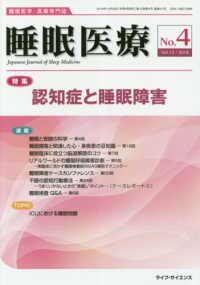- ホーム
- > 洋書
- > 英文書
- > Religion / Ethics
Full Description
The last few decades indicate a growing interest the world over to know more about Buddhism in the way it developed and is practised in the Tibetan tradition. The availability of a large number of translations of Tibetan Buddhist literature can be attributed to this growing interest in Tibetan Buddhism.
The task of transmitting truths embedded in an old language like Tibetan to a modern one like English presents enormous problems.
The history of translation of Buddhist texts from Sanskrit and Tibetan in various phases had been marked by the imposition of Western conceptual scheme upon Buddhist material. The result has been distortion to a greater or lesser extent of the original genuine Buddhist message. Other factors too have been responsible for inaccurate translations.
The goal should, however, be to ensure translations which will speak with genuine Buddhist voice in a language and style comprehensible to the average educated reader. Contributions to the volume by scholars both from India and abroad working on translations of Buddhist texts look at the various facets of the problems as experienced by them.
The contributions in the volume focus on constraints that translators face and steps and inputs required to facilitate achievement of the desired goal.
Contents
Acknowledgements
Introduction 1.
Theory and Principles of Translation
I. The Methodology of Translations from Classical Tibetan Lama Chimpa 14
II. Buddhist Translations: Problems and Perspectives N. Singh 20
III. Styles and Principles of Translation Elizabeth Napper 35
IV. Some Formulae for Translating: Buddhist Texts from Tibetan S.K. Pathak 43
V. Comparison as a Principle of Knowledge and its Application to the Translation of Buddhist Texts Jose Ignacio Cabezon 59
2. Problems in Translating Buddhist Philosophical Texts
I. On Translating Tibetan Philosophical Texts D. Seyfort Ruegg 75
II. Problems in Translating the Mlilamadhya-makakarika as Cited in its Commentaries Akira Saito 87
III. Liberation and Language: The Buddha-dharma in Translation Peter Della Santina 97
3. Reconstruction of Lost Sanskrit Text
I. Lost Buddhist Texts: The Rationale of Their Reconstruction in Sanskrit Mangala Chinchore 119
4. Lexicography and Terminology
I. Problems and Suggestions for Making a Tibetan-English Dictionary of Buddhist Terminology Tsepak Rigzin 138
II. Problems and Methods in Translation of Buddhist Texts from Tibetan Joe Branford Wilson 148
III. Upon Translating Philosophical Terminology Georges Dreyfus 168
IV. An Opinion on Translating Buddhist Terminologies (Focusing on the Term PratTlyasamutpdda) Chogkhan'Thubten Tandhar 177
V. On the Usages of the Pronoun `Khyocli Shunzo Onoda 181
5. Translator and Translation
I. My Experience as a Translator Karma Monlam 188
II. Editors and Readers Christian Lindtner 193
III. Co-Translation Its Value and Problems Migmar Tsering 205
IV. The Importance of Team-Work and Consensus on Terminology in Translating Buddhist Texts Sharpa Tulku 209
V. The Author versus the Subject as the Focus in Tibetan Translation Glenn H. Mullin 215
6. Specific Problems I. Styles and Problem Areas in Translating from Tibetan into English Ven Tenzin Dorjee 222
7. Role of Dharma Centres in Buddhist Translations
I. Examples of a Dharma Centre's Contribution in the Field of Translation: Study Programme and Dictionary Oliver Petersen 229








